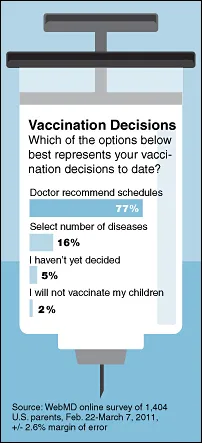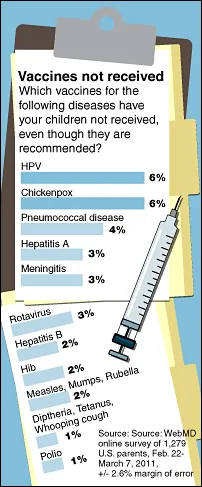



- Viagra
- Sildenafil Citrate (TP)
- Sildenafil Citrate TEVA
- Tadalafil TEVA
- Tadalafil ACCORD
- Tadalafil DAILY
- Vardenafil TEVA
- Vardenafil ZYDUS
- Sildenafil Citrate (GS)
- Cialis
|
WebMD Survey: Safety Biggest Vaccine Worry for Parents
2011-04-01
|
WebMD Survey: Safety Biggest Vaccine Worry for Parents

 March 31, 2011 -- Parents worry a lot about vaccine risks and side effects, and most of them are questioning doctors about those concerns.
March 31, 2011 -- Parents worry a lot about vaccine risks and side effects, and most of them are questioning doctors about those concerns.
A recent WebMD survey of parents found that:
- About two-thirds search online for information about the vaccines recommended for their children.
- Nearly 70% say they're looking for news about potential vaccine risks, and for news of benefits that might offset those risks.
- 66% said they had either questioned or refused vaccines.
"There is an overwhelming amount of health information available. How to tell what information is reliable and accurate can be a challenge," says WebMD Medical Editor Louise Chang, MD, an internal medicine specialist and mother of two young children.
Most respondents, 77%, intend to vaccinate their children according to the recommended schedule, although some will refuse all vaccines altogether, and many more will follow an “alternate” vaccine schedule.
WebMD conducted the survey in late February and early March to gain insight into parents’ attitudes toward vaccines, particularly in light of the recent news that a study linking vaccines to autism is being called a fraud and the ongoing whooping cough epidemic.
Which Vaccines Parents Refuse Most
 The survey shows that deep concerns remain among parents regarding vaccines.
The survey shows that deep concerns remain among parents regarding vaccines.
Topping the list of vaccines that parents refuse are the HPV (human papillomavirus) and chickenpox (varicella) vaccines. For each vaccine, 6% of parents say they won't give it to their kids.
The HPV vaccine protects against certain strains of HPV, which is sexually transmitted. It's recommended for girls ages 9 to 26 to help prevent cervical cancer. One of the two HPV vaccines is also recommended for boys ages 9 to 18 to help prevent genital warts.
In WebMD's survey, safety concerns were parents' top reason for their kids not getting vaccinated against HPV.
Safety also topped the list of reasons why parents say their kids won't get the chickenpox vaccine. Among those who refused the chickenpox vaccine, 21% said they were worried about its safety.
"Some parents may not consider chickenpox to be very serious. But it's important to know that chickenpox can have serious complications including skin infection and scarring, pneumonia, brain damage, and death," Chang says.
For similar reasons, 4% of respondents said their kids hadn't gotten the pneumococcal vaccine; 3% for the hepatitis A, meningitis, and rotavirus vaccines; 2% for the hepatitis B, Hib, and measles-mumps-rubella vaccine; and 1% for the polio and diphtheria-tetanus-whooping cough vaccines.
Safety wasn't the only concern. Some parents cited "religious or philosophical reasons" for not getting one or more vaccines. For instance, among those parents whose kids hadn't been vaccinated against measles, mumps, and rubella (the MMR vaccine), 23% said they oppose vaccines for religious/philosophical reasons.
Does Vaccine Info Change Vaccine Opinions?
The survey suggests that while parents are actively seeking out information, they aren't making health decisions based solely on what they find online. When asked about important influences on their choices about childhood vaccination, 88% say their doctor's advice is somewhat or very important.





